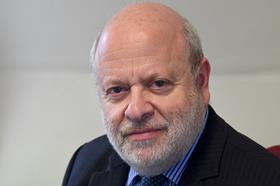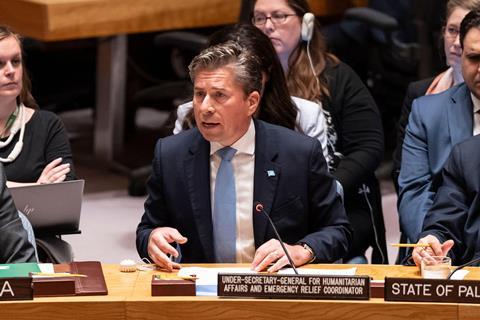It is rare now to read a political commentary without coming across the sentence ‘the international rules-based order is breaking down’.

We have doubtless all seen it. And my question is: why are lawyers not more vocal in protest? Our professional lives are based on the continuance of a rules-based order. If such an order were breaking down domestically, our bars would be issuing statements and taking action – witness the reactions of the Turkish or American bars to domestic developments in their respective countries.
But when the international order is breaking down, we (mostly) sit on our hands.
There are daily reminders of what is at stake. The issues in many international disputes are polarising and I do not intend to take sides in this article, other than preferring a rules-based order to regulate human affairs.
To take just one example, the UN emergency relief coordinator Tom Fletcher (pictured), former principal of Hertford College, Oxford and former British ambassador to Lebanon, gave a heartfelt speech at the UN Security Council last week about the aid position in Gaza. In what was a distressing listen, he said that previous reviews of the UN’s conduct in cases of large-scale violations of international human rights and humanitarian law have pointed to the collective failure to speak to the scale of violations while they were being committed. He urged respect for international humanitarian law.

‘Respect for international humanitarian law’ – that should make us sit up as lawyers. I am not interested here in the rights and wrongs of who did what to whom. But we can all agree as lawyers that the law should be respected and we should all be concerned when, regardless of Gaza and the players there, its worldwide grip is crumbling.
Of course, the international order is different to the domestic order. Most lawyers are involved in domestic casework, and only a relative handful in international law and its various shades (covering so many fields and categories). Among many other differences, international law does not usually share the same enforcement mechanisms as the domestic and is subject to a different power-play.
But the resolution of disputes through peaceful means via agreed mechanisms is our lifeblood. So why aren’t lawyers – as lawyers, not party politicians or activists for a political cause – more vocal in decrying current developments and supporting the existing mechanisms?
There was a very interesting article in the Verfassungsblog last week on an aspect of this subject. Its title, ‘In the graveyard of international law’, gives an indication of its direction. Its question was different to mine, though. It asked: what does the destruction of international norms mean for international lawyers?
I am not so interested in the response of international lawyers, who of course will be concerned, but of all lawyers. A destruction of norms for an important area of law is not of sectoral interest alone.
The author breaks international lawyers into three groups: ostriches (who continue as if nothing much has changed, in the hope that normality returns); owls (wait and see what emerges before taking flight); and octopuses (use existing rules but at the same time reinvent the system). The author prefers the octopus and says that the discipline’s future depends on integrating the instinct for continuity with the energy of rupture.
I understand that. But I wish – to continue with the animal analogy – that lawyers (all of us and not just those whose work is directly affected) would be more like dogs, barking warnings at those undermining the current system, and also actively and publicly shepherding future developments to ensure fairness, access to justice and the other values that we cherish as part of the rule of law.
This is important, because these changes are not restricted to the law around wars and their consequences. The vast array of international law is affected.
For instance, there is international trade law, overseen by the World Trade Organization (WTO). The US has paused payments to the WTO amounting to 11% of its budget. At the same time, China, Canada and the EU have begun dispute settlement proceedings before the WTO as a result of the tariffs introduced recently by the US administration. Who is willing to put money on the US continuing to support the WTO?
The US plans to withdraw altogether from the World Health Organization, which has just agreed on a draft ‘pandemic treaty’ to help better coordinate global health crises.
We know that the 1951 Refugee Convention is under great strain, as countries try to stop the flow of migrants.
The Paris climate treaty is under similar threat, as countries face the economic cost of decarbonisation.
All the topics covered create a polarised debate among citizens. But can’t we, as lawyers, agree that rules-based systems and dispute settlement is the best way forward?
Start barking, dogs.
Jonathan Goldsmith is Law Society Council member for EU & International, chair of the Law Society’s Policy & Regulatory Affairs Committee and a member of its board. All views expressed are personal and are not made in his capacity as a Law Society Council member, nor on behalf of the Law Society































6 Readers' comments